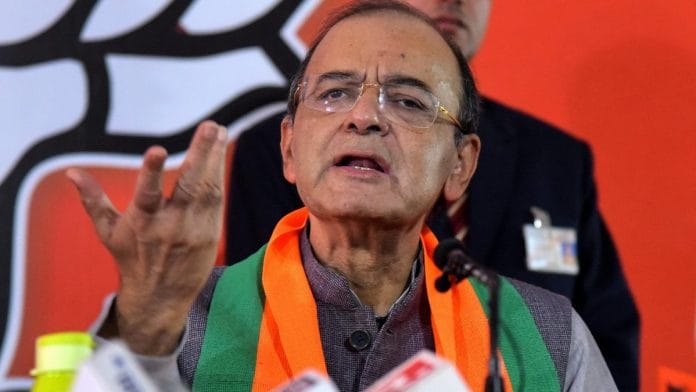Arun Jaitley had criticised the SC order quashing the NJAC in 2015, but a judicial magistrate ordered that he be tried for sedition and encouraging mutiny.
New Delhi: In October 2015, Union Finance Minister Arun Jaitley dodged the bullet called sedition. But for the intervention of the Allahabad High Court, Jaitley may still have been facing trial for having allegedly tried to “excite disaffection towards the government established by law”.
A judicial magistrate had ordered that Jaitley be tried under Section 124A (sedition) and Section 505 (encourage defence forces to rise in mutiny).
But how did Jaitley try to do this? Simply by writing a Facebook post titled ‘NJAC Judgement – An Alternative View’, which was basically a well-argued critique of the Constitution bench judgment in the National Judicial Appointments Commission case.
In his post, Jaitley, who is also a senior Supreme Court lawyer, had picked holes in the judgment, by which the Supreme Court had set aside the act passed by Parliament which would have replaced the collegium system of judicial appointments with the NJAC.
However, acting on a complaint, the magistrate decided that the Facebook post was Jaitley trying to break the country (‘sedition’).
Also read: Criticism of government, calling country ‘racist’ not sedition, says outgoing Law Commission
The magistrate’s order
In his order, the magistrate recorded that no citizen had a right to disrespect the three pillars of democracy – the executive, legislature and judiciary.
Questioning Jaitley’s post, he then proceeded to record that an order of a court could be questioned only by following a procedure prescribed by law.
He even went to the extent of holding that since no person is entitled to create or generate hatred or contempt against an elected government established by law, Jaitley had prima facie done the same, as his comments “undoubtedly spread hatred and contempt against a duly elected government”.
It possibly escaped the magistrate’s notice that Jaitley was and continues to be one of the senior-most ministers in the Narendra Modi government.
Why HC overturned the order
Jaitley then approached the Allahabad High Court, which quashed the magistrate’s order.
While doing so, Justice Yashwant Varma observed that Jaitley’s piece did not “incite the people to insurrection or rebellion”.
“Disrespect (of the Supreme Court), even if it were assumed that the article did so, does not render the action liable to prosecution for offenses under section 124A or section 505. The right to air an opinion, to dissent, intellectual discourse are the heart and soul of the freedom of speech and expression which stands conferred upon all citizens by our Constitution,” the HC judgment said.
It further observed that the magistrate appeared “to have closed his eyes to the well-settled view that healthy criticism or even intellectual disagreement with a particular view of a judge contained in a judgment of the court is not a crime”, adding that this held true even if the view expressed was “unacceptable or even unpalatable to some”.
The court also noted that before passing the order against Jaitley, the magistrate would have done well to remember the words written by Justice V.R. Krishna Iyer in his judgment in the Baradakant Mishra versus Registrar of Orissa High Court.
“…Vicious criticism of personal and administrative acts of Judges may indirectly mar their image and weaken the confidence of the public in the judiciary, but the countervailing good, not merely of free speech but also of greater faith generated by exposure to the actinic light of bona fide, even if marginally overzealous, criticism cannot be overlooked. Justice is no cloistered virtue,” the jurist had written.
Justice Varma said: “The magistrate in the opinion of the court clearly failed to apply judicial mind, acted irresponsibly and failed to bear in mind the caution and circumspection which should have preceded his assuming jurisdiction and issuing summons.”
Also read: Finance minister Arun Jaitley and his experiments with untruth







In China, for a brief period after Mao’s death, there was active a hugely infamous GANG OF 4. Mao’s own wife was one of the four. I don’t remember what fate was meted out to them when Deng Xiaoping came to power, but today’s situation in India has often reminded me of that part of our neighborhood history.
Today in India we have a similar infamous gang of 4 which some may say will deserve to be tried for sedition or treason if there is justice in India of tomorrow, and if rulers of tomorrow have the courage to pull it off. These four are: Modi, Amit Shah, Jaitley, and Ravi Shankar Prasad. Actually, with inflation, you can say the list now consists of 5. The fifth “luminary” begin Adityanath.
Even Modi can be booked under sedition law as he almost went on to say Left has not cared for Hindu sentiments in order to follow SC order. When PM says it can also make people to rebel against state after all they get embolden when head of the country speaks like ordinary people.
Good that Kanhaiya Kumar and friends are not being tried before that magistrate.